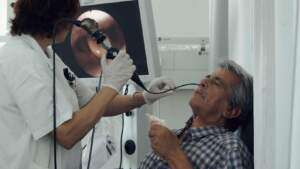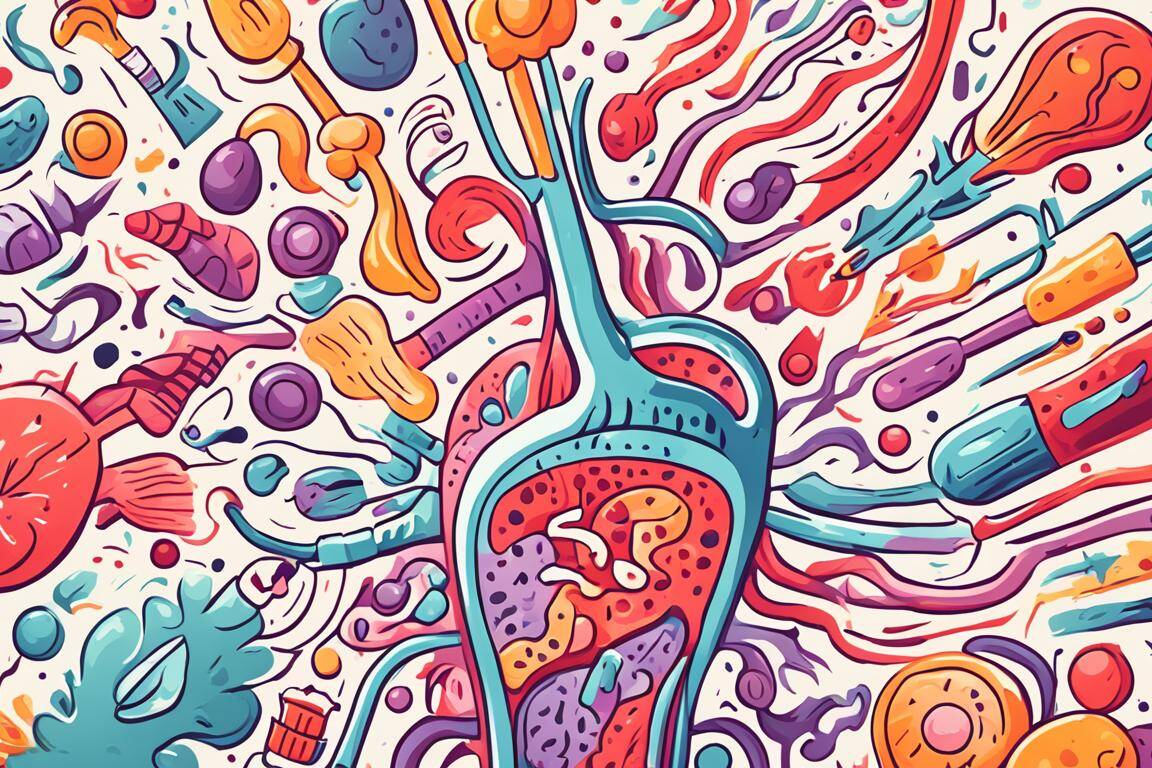If you have gastrointestinal (GI) bleeding, your treatment depends on why and where it’s happening in your gut. Doctors use many methods, both medical and surgical, to stop the bleeding and fix the main problem.
Table of Contents
ToggleYour healthcare team might perform tests like endoscopies, colonoscopies, and angiograms to find the issue. They can do things to stop the bleeding right then. This might include using medicine, heat, electricity, or a laser to close off blood vessels. They can also put clips or bands on the area. Then, you might get medications to help heal any ulcers or infections causing the GI bleeding.
For rare cases where bleeding is very bad and can’t be stopped with the above methods, surgery could be needed. Noninvasive tests might not always show where the bleeding is. If that happens, gastroenterologists might need to step in. These experts in digestive health help decide how to treat the bleeding.
Today, researchers and doctors are always looking for better ways to treat gastrointestinal bleeding. Places like the Mayo Clinic are where many new treatments are being tested. Working closely with your healthcare team means you can get a plan made just for you. This can help control this serious health issue.
Understanding Gastrointestinal Bleeding
Gastrointestinal (GI) bleeding can start from many points along the digestive tract. This includes the esophagus, stomach, small intestine, and colon. It can happen because of things like hemorrhoids or more serious problems like ulcers and cancers.
Lower Gastrointestinal Bleeding Symptoms
The symptoms of lower GI bleeding come from the small or large intestine. They might include seeing bright red or maroon stool, seeing blood in your stool, or noticing blood in the toilet. These can be signs of lower gastrointestinal bleeding symptoms.
Causes of Gastrointestinal Bleeding
Many things can be causes of gastrointestinal bleeding. This includes ulcers, diseases like Crohn’s or colitis, abnormal blood vessels, diverticula, and polyps or cancer in the colon. Even a little GI bleeding over time can lead to anemia or low blood counts.
People with suspected GI bleeding often see a gastroenterologist. These doctors specialize in the digestive system. Getting ready to see the doctor might include not eating before certain tests, and making lists of symptoms and questions to ask.
Diagnosing the Source of Bleeding
Figuring out what’s causing GI bleeding is very important. Doctors start by asking about your health history and doing an exam. They look for clues about where and why the bleeding is happening. Then, they might do tests to learn more.
Upper Endoscopy

An upper endoscopy is a key test for GI bleeding. It lets doctors see inside your esophagus, stomach, and the start of your small intestine. They look for things like ulcers, tumors, or abnormal blood vessels that could be the cause.
Colonoscopy
If you’re bleeding in your lower GI tract, a colonoscopy can help. This test checks your colon and rectum for issues. It looks for things like hemorrhoids, polyps, diverticula, or tumors that might be the reason.
Imaging Tests and Angiography
Other imaging tests can also show where the bleeding is. Things like CT scans, angiography, and radionuclide scans are used. They find the bleeding spot and help plan how to treat it.
Medical Treatments for GI Bleeding
Managing gastrointestinal (GI) bleeding is very important. Doctors use medical treatments to stop the bleeding. For upper GI bleeding cases, they often give patients proton pump inhibitors (PPIs). PPIs cut down on stomach acid to aid in healing the affected areas.
Proton Pump Inhibitors
Drugs like omeprazole, esomeprazole, and pantoprazole help with upper GI bleeding. They stop the enzyme system that makes stomach acid. This reduces acid, which helps the bleeding to stop.
People with upper GI bleeding usually get prescribed PPIs. These drugs control the issue and help heal.
Antibiotics and Anti-Ulcer Medications
Besides PPIs, doctors might give antibiotics and anti-ulcer drugs. These are for treating what’s causing the bleeding. For instance, peptic ulcers or a bacterial infection are common causes. Medications help to stop the bleeding by treating these issues.
Alongside these treatments, patients may also need endoscopic or surgical help. This full approach is key to healing from GI bleeding and preventing it in the future.
Endoscopic Treatments
Endoscopic treatments are key in dealing with GI bleeding. They work directly on the bleeding source. Minimally invasive methods are used to stop the bleeding and help heal.
Injecting Medications at Bleeding Site
Doctors may inject medications, like epinephrine, right at the source. This tightens blood vessels, helping blood to clot and stop the bleeding. It’s a good way to treat GI bleeding without surgery.
Cauterization and Laser Therapy
Heating probes or lasers are sometimes used to seal blood vessels. The heat makes the blood clot, stopping the bleeding. This method is handy for specific bleeding problems in the digestive system.
Banding and Clipping Bleeding Vessels
Doctors might choose to band or clip the bleeding vessels. They use small rubber bands or clips to stop the leak. It’s a very precise way to treat the bleeding spot.
Endoscopic methods give doctors many options for treating GI bleeding. These methods often solve the problem without the need for major surgery.
gastrointestinal bleeding treatments
Treating gastrointestinal bleeding depends on the cause and where it happens. Doctors use different treatments, like medicines or surgery, to stop the bleeding.
If you have gastrointestinal bleeding, you might get medicine to reduce stomach acid. If the bleeding is severe, doctors might do surgery to find the source. First, though, they will try noninvasive tests to locate the problem.
Endoscopic procedures are very important in treating this kind of bleeding. These include looking into the body with tools like scopes and cameras. Doctors also use blood tests to diagnose the issue.
Scientists are also trying new ways to treat gastrointestinal bleeding. The hope is to help patients recover better. People who lose a lot of blood might need fluids and blood from donors to help.
Talking openly with your doctor is very important when dealing with this issue. Make sure to tell them about your symptoms and medicines. This will help them give you the best care.
Surgical Interventions
When treatments through medicine and endoscopy do not work well, or the bleeding is very severe and life-threatening, surgery may be needed. These steps are taken after trying other methods that are less invasive to stop the bleeding.
Laparoscopy for Acute Bleeding
Laparoscopic surgery helps find and stop the sudden bleeding in the gut. A small camera, called a laparoscope, is used, making the surgery less invasive. This method includes small cuts in the abdomen for the camera. Doctors see the problem area and can stop the bleeding by burning the area or by tying off the blood vessels.
Open Surgery (Laparotomy)
If the bleeding problem is more complex and ongoing, and if the less invasive methods haven’t worked, open surgery may be needed. This surgery allows a doctor to see the whole gut directly. They can then fix or remove what is causing the bleeding.
In surgery for gut bleeding, doctors turn to these methods when other medical and less invasive treatments have not had the desired effect. These surgeries are crucial when the bleeding cannot be controlled and poses a serious threat to the patient’s life and health.

Managing Underlying Conditions
To help with gastrointestinal bleeding, it’s key to deal with its main causes. This means taking care of diseases like GERD and IBD. People use medicines, change their diets, and try other methods to get these under control. Doing this can stop GI bleeding from happening again.
Treating Gastroesophageal Reflux Disease
If you have GERD that leads to upper GI bleeding, some steps can make you feel better. Doctors might give you PPI medicines that lower stomach acid. Lifestyle changes like not eating trigger foods, staying at a good weight, and sleeping with your head up can also help with GERD. This cuts down on the chance of bleeding in your stomach.
Inflammatory Bowel Disease Management
If you’re dealing with Crohn’s or ulcerative colitis, you have a higher risk of GI bleeding. But by using medicines, changing your diet, and trying different treatments, you can lower this risk. Your doctor might have you take anti-inflammatory drugs or give you biologics to help heal your gut.
Preventive Measures
Prevention is key when it comes to GI bleeding. It’s best to avoid these problems by taking some steps. This includes using fewer NSAIDs and changing your lifestyle.
Limiting NSAID Use
NSAIDs like ibuprofen and aspirin can harm your stomach. They make GI problems more likely. Taking them with a PPI can lower this risk, but it’s best to avoid NSAIDs when you can.
Lifestyle Modifications
There are simple life changes that can prevent GI bleeding. Things like less drinking, quitting smoking, and a healthy diet work wonders. They lower the chances of facing GI bleeding issues.
Blood Transfusions and Fluid Replacement
When someone has significant gastrointestinal bleeding, they might need blood transfusions and IV fluids. These help keep their blood levels stable and replace lost fluids and cells. These steps are very important in treating the immediate effects of severe bleeding.
Research in Lisbon, Portugal shows most cases of bleeding got red blood cell (RBC) transfusions. About 71% used only RBCs, and 22% also got other treatments. The average hemoglobin level to start a transfusion was 7.6 g/dL. On average, each case needed 2 RBC units.
For those needing more than just RBCs, like FFP or PCC, they usually got 3 RBC units, 3 FFP, and 1 unit of platelets. The study suggests that for upper GIB, the hemoglobin level to start a transfusion was a bit lower, at 7.5 g/L, than for lower GIB, at 7.7 g/L. This shows doctors decide treatment based on where the bleeding is.
| Blood Product | Median Units Transfused |
|---|---|
| Red Blood Cells (RBC) | 2 units |
| Fresh Frozen Plasma (FFP) | 3 units |
| Platelets (PC) | 1 unit |
The study underlines the key role of blood transfusions and fluid replacement in treating severe gastrointestinal bleeding. These steps can stabilize a patient and help find and treat the cause of the bleeding.
Clinical Trials and Emerging Therapies
Researchers keep looking for new gastrointestinal bleeding treatments. They’re testing new medicines, endoscopic ways, and more treatments. These could help patients with GI bleeding much better. If these new ways work well, doctors might use them more in the future.
Some recent studies have found good ways to deal with gastrointestinal bleeding. One study looked at how putting a tube down the throat before it bleeds more helps. There are new rules in Europe and Asia for using a tube to look inside and stop heavy bleeding in the upper gut.
Also, scientists are looking at ways to give people fluids better when they are badly bleeding inside. They have made tools to guess if someone might die, how long they’ll need to stay, and how much it might cost. This helps doctors choose the best treatments.
The way we treat gastrointestinal bleeding is always getting better. With new treatments and ways to figure out what’s wrong, doctors can help patients more. These changes are good news for people facing this serious health issue.
Preparing for Your Appointment
When you go see a doctor about gastrointestinal bleeding, get ready. Make a note of your symptoms and the drugs you take. Also, jot down your past treatments for this issue. You should be ready to talk about how bad and how long you’ve been bleeding. Tell if anything makes it worse or better.
What to Expect from Your Doctor
Your doc will do a checkup and some tests to figure out what’s going on. You might need blood tests, looking at your stool, and putting a tiny camera in your stomach and colon. After checking the results, your doctor will make a plan to stop the bleeding.
Tell your doctor about the blood in your stool and what makes it worse. They’ll also ask about your health history. This includes past gut problems or other issues that might be making the bleeding happen.
When you tell your doctor all your symptoms and history, they can figure things out. This is key to getting the right treatment to fix your gut bleeding.
Conclusion
Gastrointestinal bleeding is very serious and can be life-threatening. Thankfully, there are many successful treatments. It’s important to work with your healthcare team to find the right diagnosis and treatment.
Doctors are always learning new ways to treat GI bleeding. There are about 50 to 150 GIB cases in every 100,000 people. Sadly, this condition can be deadly. But, if diagnosed quickly and treated well, the chances of getting better are good.
Staying up to date on GI bleeding treatments is key. By working closely with your doctors, you can help in managing this condition. This not only improves your recovery but also lowers the risks of future problems. Many people can fully recover from GI bleeding and live their normal lives again.
FAQ
What are the symptoms of lower gastrointestinal bleeding?
Symptoms may include seeing bright red or dark blood in your stool. You might notice blood on toilet paper after you use the bathroom.
What are the common causes of gastrointestinal bleeding?
Peptic ulcers, inflammatory bowel diseases, and hemorrhoids are common culprits. Angiodysplasia and colon polyps or cancer are also major causes.
How do doctors diagnose the source of gastrointestinal bleeding?
They start by asking about your health and doing a physical check. Then, they use tests like endoscopies and blood tests to find the cause.
What medical treatments are used for gastrointestinal bleeding?
Treatments often begin with medications like proton pump inhibitors and antibiotics. These can help with peptic ulcers and infections.
How do endoscopic procedures help treat gastrointestinal bleeding?
During these procedures, doctors can stop the bleeding. They might use medicine, heat probes, or put on bands or clips to help.
When is surgical intervention necessary for gastrointestinal bleeding?
If non-surgical methods don’t work, surgery may be needed. This is also true in cases of very heavy bleeding that’s life-threatening.
How can underlying conditions that cause gastrointestinal bleeding be managed?
Managing conditions like GERD and IBD is key to preventing future bleeding. Medication, diet, and lifestyle changes are often the focus.
What preventive measures can reduce the risk of gastrointestinal bleeding?
To lower the risk, avoid regular use of NSAIDs and heavy alcohol. Quit smoking and eat a diet that’s kind to your stomach.
How are blood loss and fluid replacement managed in cases of severe gastrointestinal bleeding?
In severe cases, patients get blood and fluids through IVs. This helps keep their health stable and replaces lost blood.
What new treatments are being explored for gastrointestinal bleeding?
Doctors are looking into new medicines and procedures. These might offer better care for people dealing with GI bleeding.
How should you prepare for a doctor’s appointment for gastrointestinal bleeding?
Before your visit, write down your symptoms, medicines, and health history. Also be ready to talk about how bad the bleeding is and how long it’s been happening.
About The Author

Medically reviewed by Dr. Nivedita Pandey, MD, DM (Gastroenterology)
Senior Gastroenterologist & Hepatologist
Dr. Nivedita Pandey is a U.S.-trained gastroenterologist and hepatologist with extensive experience in diagnosing and treating liver diseases and gastrointestinal disorders. She specializes in liver enzyme abnormalities, fatty liver disease, hepatitis, cirrhosis, and digestive health.
All content is reviewed for medical accuracy and aligned with current clinical guidelines.
About Author | Instagram | Linkedin





